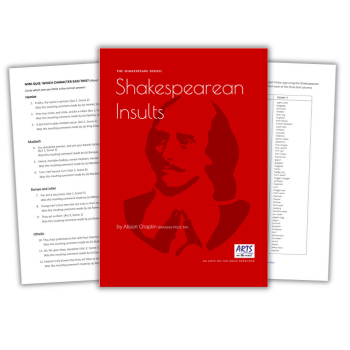This Shakespearean insults pack is great for independent study or classroom fun. It contains:
- Shakespearean insults from five different Shakespeare plays
- ‘Which Character Said This?’ mini quiz (plus answers)
- fun Shakespearean ‘insult generator’
This pack is useful for secondary students studying Shakespeare, performing in a Shakespeare play or taking part in a drama group activity.
It’s also a fun Shakespearean language exercise for an English or literacy class. The plays covered are Hamlet, Macbeth, Romeo and Juliet, Othello and A Midsummer Night’s Dream.
About Shakespearean insults
Shakespeare was the put-down king of his era. He had a witty and sometimes cruel way with words for his characters to use against each other. He also brought many insulting phrases and expressions into current popular use.
Hamlet
Hamlet is one of Shakespeare’s great tragedies. The main theme is revenge, but honour, trust and love are also strong themes in this play. The insults therefore focus on the fickle or dishonest nature of some of the characters.
As Hamlet discovers more about his father’s murder he becomes very bitter. A lot of Hamlet’s insults are therefore sarcastic asides and angry musings. For example:
You are a fishmonger (Act 2, Scene 2)
Macbeth
Macbeth is another of Shakespeare’s tragedies and includes some of the most famous lines ever quoted. The main themes are ambition, loyalty and retribution.
As events unravel, many of the insults in Macbeth stem from fear, panic and an increasing sense of Lord and Lady Macbeth’s guilt. For example:
Go, prick thy face, and over-red thy fear, Thou lily-liver’d boy (Act 5, Scene 3)
Romeo and Juliet
Romeo and Juliet is probably the most famous of Shakespeare’s tragedies. The main theme of the play is love in all its guises: family ties; loyalty; friendship; unrequited love; passion; admiration; forbidden love and romantic love.
Ironically, despite its tragic undertone, the play has some of the funniest Shakespearean insults. For example:
I do bite my thumb sir (Act 1, Scene 1)
Othello
Othello is a dramatic tragedy containing the familiar themes of love and jealousy, but it is also a play about status, honour and identity.
Othello’s need to be seen as a noble man and his desire for respect clouds his judgment. He sees treachery where there is none and fails to see the deceit of those who trick him.
Many of the Shakespearean insults in this play form around misguided beliefs, misunderstandings and misinterpretations of the truth, but there are also many angry retorts and accusations of bad behaviour. For example:
Thou art a villain (Act 1, Scene 1)
A Midsummer Night’s Dream
A Midsummer Night’s Dream Is one of Shakespeare’s most famous comedies. It’s a magical fairytale full of fairies and sprites. The play’s main theme is love but it focuses on unrequited love, obstacles and misunderstandings.
The fairies mess around and cast spells so that people previously in love hate each other and vice versa. Consequently, many of the Shakespearean insults are witty and formed from characters’ confusions. For example:
Oh me, you juggler, you canker-blossom (Act 3, Scene 2)
Arts On The Move, run by Alison Chaplin, provides high-quality creative resources and support for teachers, drama practitioners, young actors and youth theatre directors.











